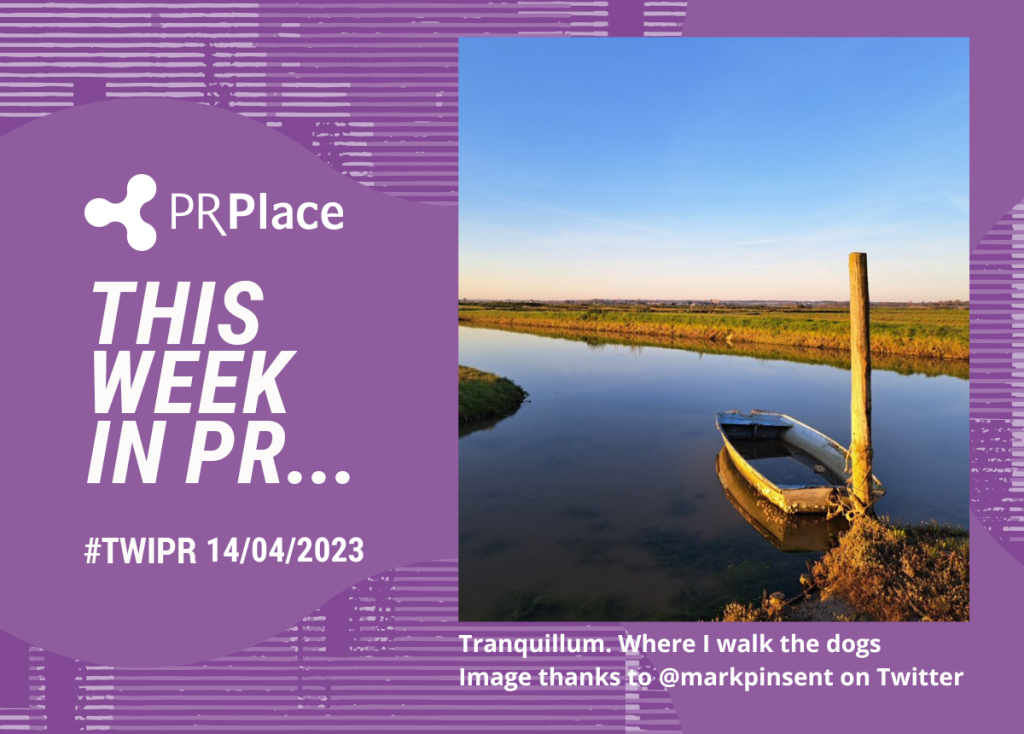This week in PR (14 April)

About the author
Richard Bailey Hon FCIPR is editor of PR Academy's PR Place Insights. He teaches and assesses undergraduate, postgraduate and professional students.

It happened this fortnight
Profession
- Steven Shepperson-Smith: CIPR March update: Bournemouth/Glasgow/Francis Ingham (31 March)
‘Francis [Ingham] was very supportive of my MBA dissertation project, underlining the genuine support I know he offered all learners in our industry. He was further welcoming to me at events held by the Company of Communicators.’
Misinformation and disinformation
- Maja Pawinska Sims: Ukrainian PR Army Launches Platform To Combat Russian Disinformation (31 March)
‘Over the past 13 months, the PR Army has built a network of international journalists, experts, PR specialists and volunteers and worked with more than 1,200 publications in 74 countries, including Forbes, the Washington Post, the BBC, CNN and the Financial Times.’
Purpose, climate and ESG
- Tim Le Couilliard: Are we sports-washing our football shirts? (13 April)
‘Arsenal was one of the first to change its kit for campaign purposes with its “No More Red” campaign – targeted at reducing knife crime and youth violence in the capital.’ - Amelia Beale and Imogen Shaw: Purpose on Payday (31 March)
‘This month saw the Financial Conduct Authority carry out a preliminary review of ESG benchmarks, finding the overall quality was poor and outlining where improvements must be made.’
Consulting, skills and careers
- Claire Foster: Be Seen (no date)
‘Time saved by not commuting is on average 73 minutes in the UK and according to the National Bureau of Economic Research, a lot of that time benefit goes back to the employer.’ - Emma Drake: Ten Tips to nail you first or next speaking opportunity [podcast] (13 April)
‘It’s not sales-led, but [speaking] adds authority and authenticity to your personal or your business brand.’ - David Olajide: How to use LinkedIn to build your personal brand (10 April)
‘Twitter has always been a popular platform for professionals to connect and share their thoughts. However, in recent years, there has been a trend of people leaving Twitter for LinkedIn. LinkedIn offers a more professional environment for individuals to connect and share their expertise.’ - Ben Smith with Jo Ogunleye, Julie Dilger and Olivia O’Brien: An insiders perspective of a modern in-house communications department, with Google UK’s comms team [podcast] (31 March)
‘Sometimes it is a bit overwhelming because Google is so big. You could talk Google 24 hours a day seven days a week and still not tell all the stories.’ - Heather Yaxley: The persistent problem of PR churn (30 March)
‘Hoping LinkedIn might offer a perspective on churn in PR, data obtained from Andrew Bruce Smith showed 4,000 of 98,000 PR professionals in the UK recorded a job change in a 90-day period (December 2020 to March 2023). This points to a 16% annual churn rate.’
Gender, diversity and wellbeing
- Sudha Singh: A conversation with Farzana Baduel, Co-Founder, Curzon PR on PR, Purpose and Leadership [podcast] (13 April)
‘I love diversity, live diversity and I love being a communications bridge between different cultures. My identity as a British Asian has helped me in straddling worlds and more importantly connecting worlds.’ - Shanil Nayee: Find Your Superpower in PR (no date)
‘Being born in the UK but with roots in Zambia and India, I look around and see very few role models that I can relate to. And I can only imagine how many other shy, sheltered Asian men there are in the world.’
Public and third sectors
- Catherine Farrell: The pain of professional ghosting (3 April)
‘While professional ghosting doesn’t create the same devastation as a doomed affair of the heart, it can still create feelings of hurt and sadness for what might have been.’ - John-Paul Danon: Doctor Google will see you now? Making sure public health campaigns work when everyone’s an online expert (2 April)
‘More than six million people in the UK now turn to social media for answers to general health queries, according to a recent article from The Media Leader reporting on new stats from Omnicom.’ - Ben Capper: How to use comms to support NHS priorities in 2023/23 (2 April)
‘Getting services back up to speed post-pandemic remains the singular biggest challenge. Here’s how comms can help make this happen.’ - Dan Slee: VERIFIED BIRD: Should the public sector pay for social media verification? Yes, and no (2 April)
‘As a strategy, a gradual easing away from Twitter is the sensible way forward. Twitter was always useful for reaching journalists and for a crisis. WhatsApp may be a better way of messaging a hack. So too is a newsroom on the website.’
Politics, public affairs and public sphere
With Labour strongly positioned to form the next UK government, Headland’s Public Affairs team has published a new report to help businesses understand Labour’s approach and the opportunities this presents for companies.
Read the full report: https://t.co/jx5b3Fl1d6 pic.twitter.com/IlybS7g4ZN
— Headland Consultancy (@HeadlandComms) April 3, 2023
- Joe Cooper: Holiday homes under the hammer as government sets out vision for reforming short-term lets (13 April)
‘The move comes off the back of increased attention on the impact that short-term lets are having in tourist hotspots such as Devon, Cornwall and the Lake District.’ - Daisy Robertson, Hannah Blackford and Ellie Summers: Former SNP Leader in Westminster, Ian Blackford MP sat down with Portland’s Senior Advisor, Alastair Campbell (11 April)
‘Less than 24 hours after the conversation with Blackford, the news broke that the former Chief Executive of the SNP and husband of former First Minister, Peter Murrell, had been arrested.’ - Beth Tarling: An own goal or a home run? Labour play hardball with election ads (11 April)
‘It’s the type of attacking politics you might be more familiar with seeing in a US election. But will it work for Labour on home ground?’
- Tom Haynes: Plan for Water: A fresh start or more of the same? (6 April)
‘Sewage discharge is a huge issue of concern in Conservative heartland seats, and so the government will be hoping both that the plan works, and that it neutralises a politically challenging issue.’
- George Esmond: #TradeTuesday: Joining the CPTPP provides Britain the opportunity for long-term trading leverage (4 April)
‘CPTPP nations are also among some of the fastest growing in the world, and a key cornerstone of the Indo-Pacific market that is expected to generate 56 per cent of all global growth from 2019 to 2050.’ - Emily Wallace with ChatGPT: I asked ChatGPT about AI and the Public Affairs industry (3 April)
‘Chatbots and virtual assistants can help streamline the process of engaging with policymakers and other stakeholders, by answering routine questions and providing information on policy positions and initiatives. This can free up human staff to focus on more strategic tasks, such as developing messaging and building relationships with key influencers.’ - Angus Hill: Powering up? (31 March)
‘The fact that ‘Powering up Britain’ was neither radical or fast enough to meet key national ambitions, doesn’t mean it’s not welcome or important.’
Brands, content, community and creativity
- James Gwinnett: Mulvaney madness or masterstroke? (11 April)
‘Is it “a shame to see such an iconic American company go so woke” (as stated by Jenner), or is it the case that the old adage is true; that “there’s no such thing as bad PR”?’
Crisis, risk and reputation
- Amanda Coleman: Are you ready and alert (13 April)
‘Anyone working in emergency management and crisis communication will be aware of the impending UK-wide test of the new emergency alert system. It happens on 23 April at 3pm and will lead to a siren noise and message being sent to all mobile phones.’ - Rod Cartwright: Managing reputational risk in 2023: it’s not ‘trust’, it’s trustworthiness that matters (5 April)
‘As a specialist in issues, crisis, risk and resilience, I see senior executives all-too-frequently think that ‘PR crises’ are most likely to stem from uncontrollable externalities. In my experience, that is almost always wrong.’ - Andy Barr: Crisis communications in the modern era: How dealing with the issue itself is now just a small part of the problem for companies (3 April)
‘The internet has made crisis communications into a far longer and more drawn-out recovery process. It is not just enough to deal with the situation that has happened via media statements and a well-prepared Q&A document of every potential negative question that a journalist may ask. Brands now need to deal with the aftermath, which is negative stories floating around Google for their company name.’
Behaviour and influence
- Son Pham: Gen Z proves celebrity gossip is in its peak era. What’s next? (13 Aprll)
‘The concept of a parasocial relationship, often a one-sided relationship, was coined in 1956 by Donald Horton and R. Richard Wohl to describe the way mass media users acted like they were in a typical social relationship with a media figure, such as feeling as though they are besties with a well-known celebrity.’
Internal communication
- Katie Macaulay with Jason Anthoine: Comms with courage [podcast] (5 April)
‘There’s probably been 50 people on this podcast that have said the same thing. What we need is a seat at the table. Well, when you get the seat at the table around everybody else, they’re all coming in there with charts and graphs. And we’re coming in there with arts and crafts. And they get all the resources because they can prove that what they’re doing is working. And all we can say is we got a bunch of likes.’
Media, digital and technology
- Jed Backhouse: The SEC Newgate AI Weekly (13 April)
‘You’ll hear different versions of ‘the latest big update in AI’ depending on whether you look at the FT or TikTok for emerging news, but the common thread continues to be the pace of development.’ - Nick Taylor: AI and climate continue to dominate European technology influencer conversations in Q1 2023 (12 April)
‘This first quarter has seen the concept of generative AI break out of the tech press and on to the front pages of media across Europe. We’re seeing hype cycles play out in a matter of months as excitement and disillusionment trade places almost daily.’ - Karen Lee: Instagram and Twitter have revealed how to hack your account growth – here is the summary (11 April)
‘While we question everything, we know that the social landscape is much like Weston-Super-Mare’s Grand Pier: you have to pay to play. From engagement to followers, every platform has a way to monetise growth, and encourages it.’
- Lily Germain: PR and AI: The new hot couple (11 April)
‘One of the wins of AI is the speed at which it can knock up content. It will optimise your time by assisting with idea generation, writing, editing and visual assets. Us mere mortals had previously only dreamed of creating content in seconds.’
- Neville Hobson: Twitter verification means little now (2 April)
‘I don’t plan on leaving Twitter – I’ve been here since 2006 – but I no longer see this social network as a primary place of engagement with people. It still has a role to play in the wider universe of people sharing opinions, news and information online but with huge caveats attached.’
Academic, education and training
#prstudent #CreatorAwards23
Lydia Cooper (Leeds Beckett): The Best of PR and Marketing on Race Week (Australian GP) (9 April)
‘F1 decided to found a new women’s competition, named F1 Academy, in order to help young female drivers progress into careers in motorsport.’


